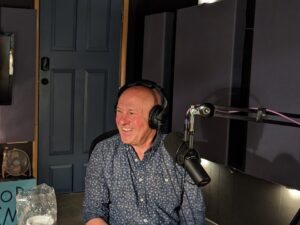RAQC Executive Director featured on science and policy podcast, Clearing The Air
Updated: October 25, 2023
Mike Silverstein is interviewed by the host and producer of the Institute for Science & Policy’s 2023 podcast Clearing The Air. (Credit: Institute for Science & Policy)
When Mike Silverstein, executive director of the Regional Air Quality Council, first started using an electric lawn mower years ago, he was often teased for using such a quiet, clean machine.
Silverstein said some people would joke, “What are you doing? Vacuuming the grass?” He would reply: “No, I’ve just cut the lawn here! You wish you were me.”
Gas-powered lawn and garden equipment are currently the fourth leading contributor to Front Range emissions, and a major contributor to the formation of harmful ground-level ozone in the region. This equipment also produces a range of harmful emissions that can have significant negative effects on human health, creating both short-term and long-term health risks for individuals exposed to them.
This is why RAQC runs Mow Down Pollution, which helps residents, businesses, and local governments transition from dirty gas-powered equipment to electric alternatives. The RAQC has also submitted a proposal for consideration this December by the Air Quality Control Commission to reduce emissions from lawn and garden equipment in the ozone nonattainment region through the use of grants for government and commercial electrification, discounts on electric equipment, and sales restrictions on gasoline equipment within the nonattainment area.
“The natural transformation to electric [equipment] is happening, and proposals that we’re considering now might speed that up and make it mandatory in the future,” said Silverstein.
Silverstein shared this story and many other air quality insights earlier this year, as one of more than 30 experts who were interviewed in 2023 for Clearing The Air, the latest season of the podcast Laws of Notion by the Institute for Science & Policy, a project of the Denver Museum of Nature & Science. This eight-part season is about air pollution in Colorado and beyond, and how residents, scientists, organizers, leaders, and legislators are navigating this complex problem that knows no borders.
Since the podcast episode was recorded, Colorado’s governor signed an executive order requiring state agencies to phase out their gas-powered lawn and garden equipment by 2025.
Before serving as RAQC’s executive director for the past five years, Silverstein began his career in air quality in the late 1980s and early 1990s with the Environmental Protection Agency, before moving over to the state of Colorado, where he worked for the Department of Public Health and Environment for 25 years. On this fifth episode of the podcast, he also contextualizes the role of the RAQC—the lead air quality planning agency in the Front Range—and its role as an advisory body within the air quality landscape in Colorado. The episode highlights how the RAQC builds out stakeholder groups, helps find common ground to move the needle on air quality, implements education, outreach, and incentive programs, and encourages voluntary activities to reduce emissions and air pollution. It also explains how the governor appoints the RAQC’s board members, who range from heads of agencies to politicians, to business leaders, to those with scientific and technical expertise.
Additionally, Silverstein notes the RAQC’s annual work sharing ozone alerts with the public each summer, to raise awareness of ground-level ozone as an air quality issue, help people protect their health, and urge them to take relevant air pollution-reducing actions.
“We can’t be perfect. We don’t have to be perfect, but we have to be better,” said Silverstein.
You can listen to Clearing The Air on its website, Spotify, Apple, Amazon, or Google.

